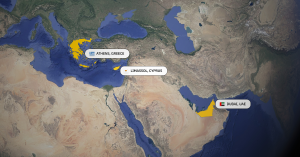With spiking inflation and stagnating growth throughout the year, Europe is closing off 2022 in an economic downturn. The Czech Republic, in particular, has been facing average monthly inflation of over 14%, nearly four times higher than in 2021, and one of the biggest electricity prices rises in the EU. Consequently, macroeconomic challenges have also been felt among the Czech startup ecosystem players.
Businesses in the Czech Republic fighting the rising costs
Thriving tech businesses during the pandemic are facing hardship in 2022. From global corporations, including Meta, Stripe, and Shopify, announcing significant layoffs of over 10% to local businesses and startups, companies have started to react to the increasing costs.
According to the Chamber of Commerce of the Czech Republic, nearly one-fifth of Czech employers are preparing for layoffs until the end of the year, particularly in the more energy-dependent industries such as construction and manufacturing. Moreover, the economic situation impacts retail and e-commerce markets, decreasing sales of less essential goods, including clothing, recreation, or household equipment, by over 10% year-over-year, Czech Statistical Office reports.
Following an online shopping boom resulting from the 2020 and 2021 pandemic years, many retailers prepared to scale their businesses. The downturn of 2022, however, cast a shadow on the plans and forced the owners to slow down and cope with prepared expansion and stocked inventories.
After the first quarter, popular Czech-based sneaker retailer Footshop announced employee layoffs, closing most of its physical stores, lowering sales targets, and adjusting its supply to maintain profit for the year. An underwear and socks-specialized Dedoles from Slovakia also released news about restructuralization that closed stores in the Czech Republic and lowered the staff number.
The first news from the Czech startup ecosystem
Last month, Czech startup Productboard was one of the first to announce a downsizing of 20%, laying off around 100 employees. The founders commented they had to adjust their costs to the macroeconomic situation and demand for software products to retain a strong financial position and get through the downturn, even though it was the most difficult decision they had made so far.
At the beginning of 2022, Productboard, a product management system, closed a Series D round of $125M, backed by VCs including Tiger Global Management, Sequoia Capital, Dragoneer Investment Group, or Czech Credo Ventures, and became the second Czech unicorn in history.
Shortly after Productboard, an Estonian-based CRM platform Pipedrive (unicorn since 2020), with a development center in the Czech Republic, announced their team size is being reduced by around 14%, which accounts for a little over 140 employees internationally, affecting the Prague office, too. Pipedrive also reports adjusting its business and product strategies in response to the changing market.
While the Czech tech ecosystem has been rather quiet regarding the ongoing situation, more measures to lower companies’ costs can be expected next year due to the projections of the stagnating economy in the country in 2023.
Economic downturn opportunity for the Czech investors
With several new funds and continuous investments, Czech investors, on the other hand, were active in 2022. Expanding the opportunities for startups from the Czech Republic and beyond, here are some of the newly established funds this year:
- Credo Ventures: 4th fund of €75M for early-stage startups from the CEE region
- DEPO Ventures: 3rd angels fund with target size €20M for early-stage startups from the CEE region
- Presto Ventures: 2nd fund of €30M for early-stage startups from the CEE region
- Czech Founders VC: New fund of €10M for early-stage startups from the CEE region
- Look AI Ventures: New fund for early-stage AI startups from Europe
According to Dealroom, Czech investors have already supported startups with more funding worldwide than in 2021, particularly in the early-stage rounds.
What has changed, however, is the investors’ approach. As various Czech venture capital representatives stated in a Hospodářské Noviny survey, investors are now more thorough and cautious during the startup investment decision-making. Another factor in favor of investors are the dropping startup valuations observed worldwide in 2022, particularly among the late-stage startups that aim to conserve capital. Czech investors have also noted the trend in the survey, highlighting a continuous interest in investing in startups, with, however, extra carefulness.







